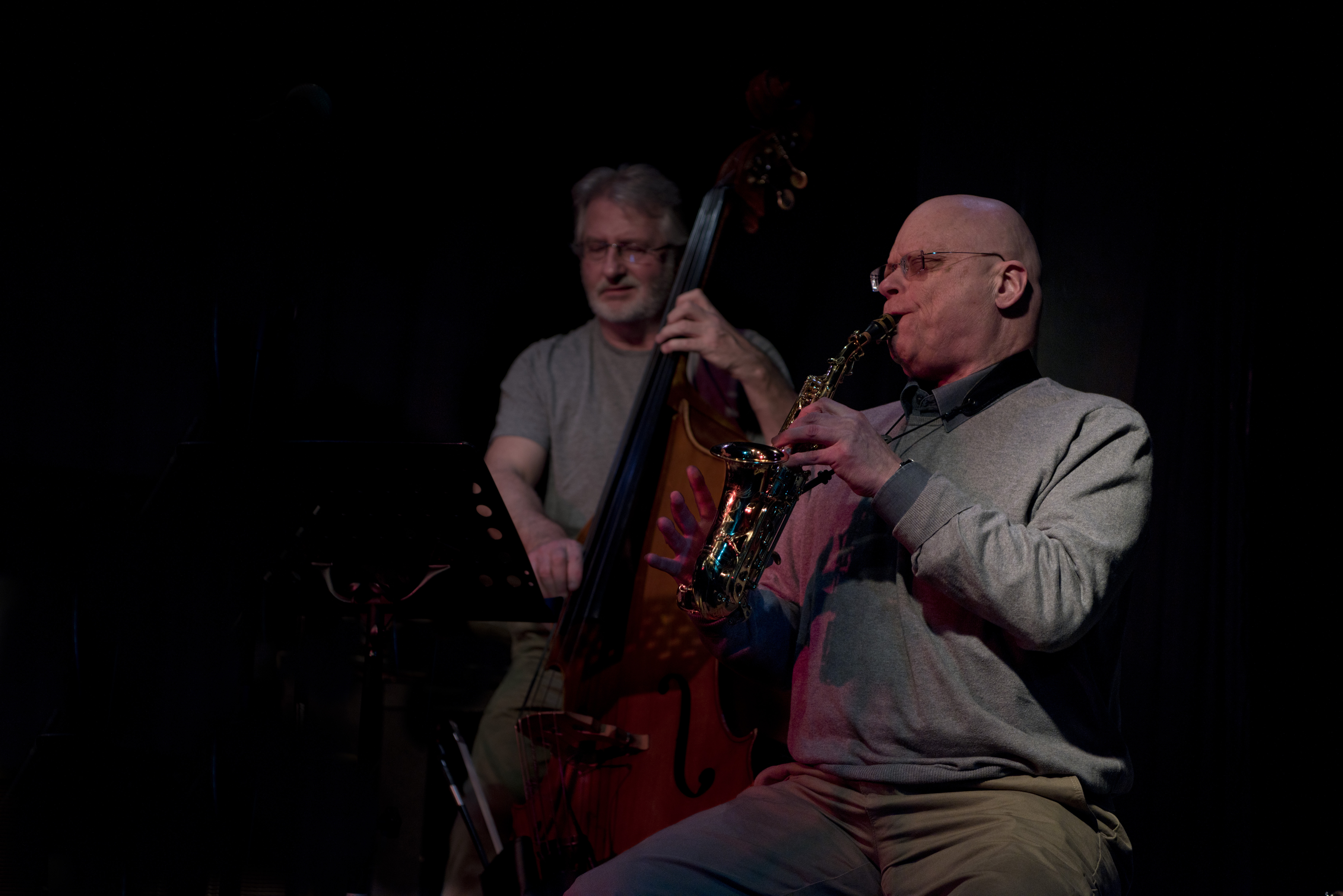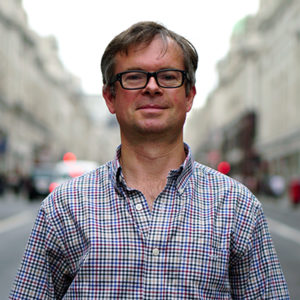John Altman interview

Normally I start interviews with the question ‘How did you get into jazz?’.
“Oh my god! Have you got a week?! Right, my whole family is in jazz, which helps. My mother had four brothers, all of whom were bandleaders. One brother, Sid Phillips, had Britain’s number one dixieland band and was a wonderful clarinet player, and another brother, Woolf Phillips, was the bandleader at The Palladium so he conducted for Sinatra, Danny Kaye, Nat King Cole, Hoagy Carmichael, Duke Ellington, Benny Goodman and everybody else.”
“So I grew up in a very strange household where basically I learnt to walk and talk to jazz. I didn’t really hear any other type of music, particularly. We had a vast record collection (78s) which, instead of throwing at the wall or the flower pots, I played and learnt them off by heart. So I was basically learning not only jazz arranging but soloing because I knew Jack Teagarden’s solos from 3 years old or whatever, which is slightly unusual.”
So what was your first instrument when you started playing?
“I started playing piano at seven and I gave up formal lessons at eleven. Since then I’ve not had a formal music lesson in my life. I started playing tenor sax at the age of twelve. My uncle came round and showed me the fingering and blowing on the Friday night and I did a gig on the Saturday. So I was plunging straight in. I was probably terrible. I played recorder at school and the fingering for a saxophone and a recorder are quite similar. If you know your way round a recorder then you’re sort of on the right road to fingering a saxophone. Just the noise you make is fairly horrendous. My uncle gave me a clarinet a bit later and I took up the flute and then discarded them whilst fairly young and stuck to saxophone.”
Tell us about how you got into composing and arranging.
“It was something I could always do. I’m sure the genetics played a part because my uncle arranged and didn’t really have formal lessons. My uncle learnt to write by watching his brother. My mum learnt to play piano by watching her brother play piano. I could always hear on a record every individual part (such as ‘here are the cellos and there’s a bassoon playing there, clarinets are doubling the violas etc.). So I always had the ability to compose and arrange. I was writing little tunes when I was seven years old so that ability showed itself. Really from then on I did what people do, somebody said ‘write an arrangement’ and I said ‘yeah, no problem’ and their jaws dropped in amazement. It was very interesting but it was just something that I could do and came easily and didn’t have to be too much of an effort. I read up on instrument ranges and had a working knowledge of how a trumpet and trombone worked and I just went from there.”
So what are you working on at the moment?
“Well I’m off talking about my life and times, Singapore to Dubai, on a cruise. I’m writing a library album at the moment for Audio Network who are a big library company in the UK and I get to go into big studios with big orchestras and do that. Basically, in terms of arranging and composing, I’ve always had the orchestral tool. I’ve moved away from doing movies a bit because I don’t really need the brain damage that’s associated with it. And I’m just generally playing and writing, you know the big band and the quartet we allow it every now and again and the writing, not too much jazz writing at the moment but basically orchestral stuff.”
What do you enjoy doing the most?
“All of it. I love playing. I love writing. I love hearing things that I’ve done played back to me, although I know how they’re going to sound when I’m writing them. It’s nice to suddenly come across things that you’ve written that you’ve forgotten about and you go ‘oh that doesn’t sound too bad’.
I like having the ability to do everything. It’s been playing and writing all the way through. I’ve managed to keep both careers going.”
Because you’ve written so much music, do you find that you get enough royalty money now, so that you can choose what you want to do?
“Well I’m in a good position now to really choose what I want to do. I just love doing everything. When I was touring I thought ‘well, I’d like to be able to go in with an orchestra because I can do it’, then when I went into the studio with my uncle Woolf he said ‘have you stopped playing yet?’ I said no but then he said ‘well you will because you won’t be able to manage both’. So I made a conscious effort not to stop playing, to get my jazz chops in order and working and playing as much as I possibly could, whether it was sitting in with people, doing jazz gigs, perhaps more so in America than here.”
So what are your favourite tunes to perform?
“I’m always attracted to tunes that are slightly off the beaten track, that nobody recorded. It’s a strange thing but I used to take Hollywood musicals (which were on television basically all the time), I’d play the films all the way through and I’d just cut out the musical numbers so I had tape after tape of Fred Astaire films or whatever, anything that was a musical. I’d cut the songs out and I’d put them down and every so often I’d hear a song and go ‘oh that would make quite a good jazz tune’. It always seems quite arbitrary that Stella By Starlight or Green Dolphin Street had become standards and I always thought that they’d become standards because somebody had picked up on them and made a classic recording of them, whether it was Miles Davis, Charlie Parker or Ahmad Jamal. The song became a standard because of them, rather than because of how good the song was. And there were great songs that had just fallen by the wayside. So quite early on I started building a repertoire of these obscure songs. And all I wanted people to do was say ‘ooh, I really enjoyed playing that’ or ‘that’s a great song, why didn’t that become a standard?’. And quite often they’d be written by people who were writers of standards like Don Raye and Gene de Paul who wrote You Don’t Know What Love Is and Star Eyes. They’re great songs but they also wrote songs that nobody ever plays as well. So I made it my business to write down those songs and if I had a quartet gig or a quintet gig I would put those songs in front of the band and say ‘let’s do this particular song’ and people would say ‘oh, I’ve never heard this in my life’.”
“The funniest story connected to that was I found this Gene de Paul song in a movie and I had dinner with the guy who sang it in the film and he said ‘there’s no such song’ and I said ‘well, there is, because you sang it’ and he said ‘well, I’ve never heard it before in my life’ so I was able to play it to him and say ‘well actually you have because you sang it’, which is quite bizarre really.
“I also enjoy playing things that, if they’re great songs, then you just love playing them. You always learn something. And you think about them and how they’re structured and why. And you never tire of that. I can play something like Star Eyes or Stella By Starlight and there’s always something new in them so I’m quite happy to do that as well, and save the more esoteric things for my own gigs.”
Is there anything else that you want to talk about?
“It’s sort of an odd career, certainly playing jazz, as I always feel more at home or more accepted (or whatever you want to say) in America than I do here. I know I’ve spent a lot of time in the States and I’ve played some big jazz festivals with some good, big name people but when I come back here I always feel that I’m not part of the scene. It’s probably because I do so many other things and the jazz musician’s life is supposed to be very dedicated and singular. So I do find that I’m relatively unknown in this country but then I’ll play in some of the biggest jazz festivals in America. It’s a strange set up. But apart from that I just really enjoy it. I’m very happy to even just play jam sessions with people in little clubs than go out to the big festivals.”
For more information on John Altman, his Wikipedia page gives you a taste of his career:
https://en.wikipedia.org/wiki/John_Altman_(composer)
John Altman performs at the Hare and Hounds in Worthing on Tuesday 25th April, 2017.



